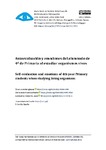Mostrar o rexistro simple do ítem
Autoevaluación y emociones del alumnado de 4º de Primaria al estudiar organismos vivos
| dc.contributor.author | González-Iglesias, Óscar | |
| dc.contributor.author | Fuentes-Silveira, María-Jesús | |
| dc.contributor.author | Rivadulla-López, Juan-Carlos | |
| dc.date.accessioned | 2022-05-23T13:05:44Z | |
| dc.date.available | 2022-05-23T13:05:44Z | |
| dc.date.issued | 2022-04-29 | |
| dc.identifier.citation | González-Iglesias, Óscar, Fuentes-Silveira, M.-J., & Rivadulla-López, J.-C. (2022). Autoevaluación y emociones del alumnado de 4º de Primaria al estudiar organismos vivos. Revista de Estudios e Investigación en Psicología y Educación, 9, 261-271. https://doi.org/10.17979/reipe.2022.9.0.8972 | es_ES |
| dc.identifier.issn | 2386-7418 | |
| dc.identifier.uri | http://hdl.handle.net/2183/30720 | |
| dc.description | Ponencia presentada en el XVI Congreso Internacional Gallego-Português de Psicopedagogía, realizado en la Universidade do Minho, en Braga (Portugal), los dias 1 a 3 de septiembre de 2021, con el patrocinio de la Associación Científica Internacional de Psicopedagogía (ACIP) | es_ES |
| dc.description.abstract | [Resumen] Un problema al que se enfrenta la enseñanza de las ciencias experimentales es la falta de actitudes positivas del alumnado hacia esta disciplina y el creciente desinterés por la misma a medida, el cual avanza con el sistema educativo. Es importante destacar que la motivación y las emociones son elementos fundamentales para aprender ciencias; además, las emociones positivas favorecen el aprendizaje y el compromiso para aprender ciencias. Por ello, y con el fin de involucrar al alumnado en el proceso de enseñanza/aprendizaje y buscar que se responsabilice de su desarrollo y resultado, surge la autoevaluación como una respuesta innovadora. En este trabajo participaron 49 estudiantes de 4º Educación Primaria de un centro educativo del noroeste de España en el curso 2019/2020 con el fin de indagar las emociones que les generaban una serie de actividades prácticas (incluyendo preguntas abiertas y cerradas) dirigidas al estudio de diferentes animales vivos (caracoles y lombrices) antes y después de realizarlas, así como conocer la autoevaluación que hacían sobre su proceso de enseñanza/aprendizaje a lo largo de la realización de la propuesta de actividades. Los resultados respecto a la autoevaluación muestran que los participantes reconocieron lo aprendido en el transcurso de la actividad, haciendo referencia a las características de las lombrices y de los caracoles, pero ninguno indica que aprendió a investigar (aspecto que sí indican en pregunta cerrada). Finalmente, en cuanto a las emociones, los participantes desarrollaron emociones positivas hacia los animales (satisfacción, protección, felicidad…). | es_ES |
| dc.description.abstract | [Abstract] A problem faced by the teaching of experimental sciences is the lack of positive attitudes of students towards this discipline and the growing disinterest in it as it moves forward with the educational system. It is important to note that motivation and emotions are fundamental elements to learn science; in addition, positive emotions favor learning and commitment to learn science. Therefore, and in order to involve students in the teaching/learning process and seek to take responsibility for their development and outcome, self-evaluation emerges as an innovative response. In this work participated 49 students of 4º Primary Education of an educational center of the northwest of Spain in the course 2019/2020 in order to investigate the emotions that generated them a series of practical activities (including open and closed questions) directed to the study of different living animals (snails and worms) before and after performing them, as well as knowing the self-assessment they did about their teaching/learning process throughout the realization of the proposed activities. The results regarding the self-assessment show that the participants recognized what they learned in the course of the activity, referring to the characteristics of worms and snails, but none indicate that they learned to investigate (an aspect that they do indicate in a closed question). Finally, in terms of emotions, participants developed positive emotions towards animals (satisfaction, protection, happiness...). | es_ES |
| dc.description.sponsorship | Este trabajo fue financiado por el Ministerio de Ciencia e Innovación (PID2020-119259GA-I00) | es_ES |
| dc.language.iso | spa | es_ES |
| dc.publisher | Universidade da Coruña, Servizo de Publicacións | es_ES |
| dc.relation | info:eu-repo/grantAgreement/AEI/Plan Estatal de Investigación Científica y Técnica y de Innovación 2017-2020/PID2020-119259GA-I00/ES/EL DESARROLLO DE LAS COMPETENCIAS PROFESIONALES DE LOS MAESTROS EN FORMACION Y EN EJERCICIO DE EDUCACION INFANTIL Y PRIMARIA RELACIONADAS CON LAS CIENCIAS DE LA NATURALEZA/ | es_ES |
| dc.relation.uri | https://doi.org/10.17979/reipe.2022.9.0.8972 | es_ES |
| dc.rights | Atribución-CompartirIgual 4.0 Internacional (CC BY-SA 4.0) | es_ES |
| dc.rights.uri | https://creativecommons.org/licenses/by-sa/4.0/ | |
| dc.subject | Autoevaluación | es_ES |
| dc.subject | Emociones | es_ES |
| dc.subject | Ciencias | es_ES |
| dc.subject | Educación primaria | es_ES |
| dc.subject | Self-assessment | es_ES |
| dc.subject | Emotions | es_ES |
| dc.subject | Science | es_ES |
| dc.subject | Primary education | es_ES |
| dc.title | Autoevaluación y emociones del alumnado de 4º de Primaria al estudiar organismos vivos | es_ES |
| dc.title.alternative | Self-Evaluation and Emotions of 4th Year Primary Students When Studying Living Organisms | es_ES |
| dc.type | info:eu-repo/semantics/article | es_ES |
| dc.rights.access | info:eu-repo/semantics/openAccess | es_ES |
| dc.date.updated | 2022-05-09T11:43:41Z | |
| UDC.journalTitle | Revista de Estudios e Investigación en Psicología y Educación | es_ES |
| UDC.volume | 9 | es_ES |
| UDC.startPage | 261 | es_ES |
| UDC.endPage | 271 | es_ES |
| dc.identifier.doi | 10.17979/reipe.2022.9.0.8972 |
Ficheiros no ítem
Este ítem aparece na(s) seguinte(s) colección(s)
-
REV - REIPE - Vol. 09, 2022 [23]
Número monográfico: XVI CIG-PP






